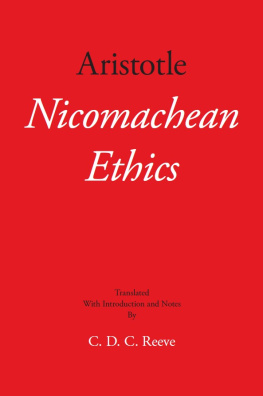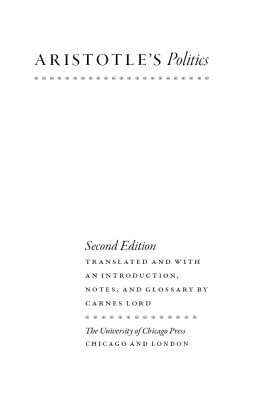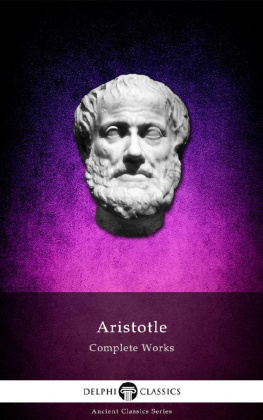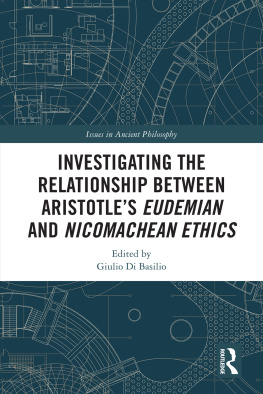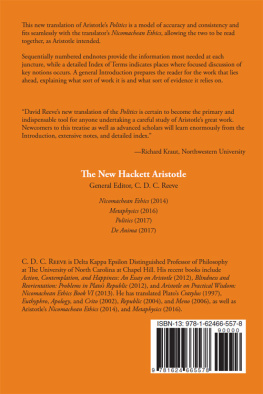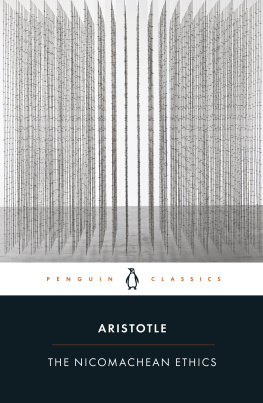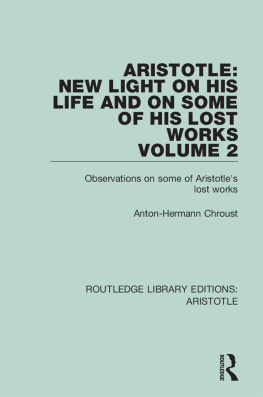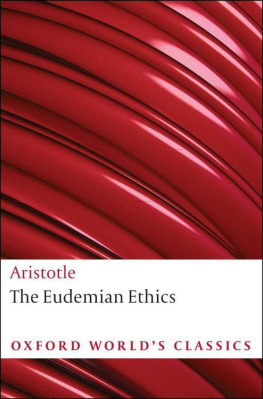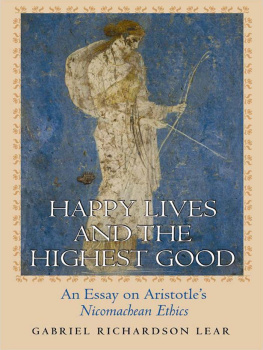Aristotle - Nicomachean Ethics
Here you can read online Aristotle - Nicomachean Ethics full text of the book (entire story) in english for free. Download pdf and epub, get meaning, cover and reviews about this ebook. year: 2014, publisher: Hackett, genre: Religion. Description of the work, (preface) as well as reviews are available. Best literature library LitArk.com created for fans of good reading and offers a wide selection of genres:
Romance novel
Science fiction
Adventure
Detective
Science
History
Home and family
Prose
Art
Politics
Computer
Non-fiction
Religion
Business
Children
Humor
Choose a favorite category and find really read worthwhile books. Enjoy immersion in the world of imagination, feel the emotions of the characters or learn something new for yourself, make an fascinating discovery.
Nicomachean Ethics: summary, description and annotation
We offer to read an annotation, description, summary or preface (depends on what the author of the book "Nicomachean Ethics" wrote himself). If you haven't found the necessary information about the book — write in the comments, we will try to find it.
Nicomachean Ethics — read online for free the complete book (whole text) full work
Below is the text of the book, divided by pages. System saving the place of the last page read, allows you to conveniently read the book "Nicomachean Ethics" online for free, without having to search again every time where you left off. Put a bookmark, and you can go to the page where you finished reading at any time.
Font size:
Interval:
Bookmark:
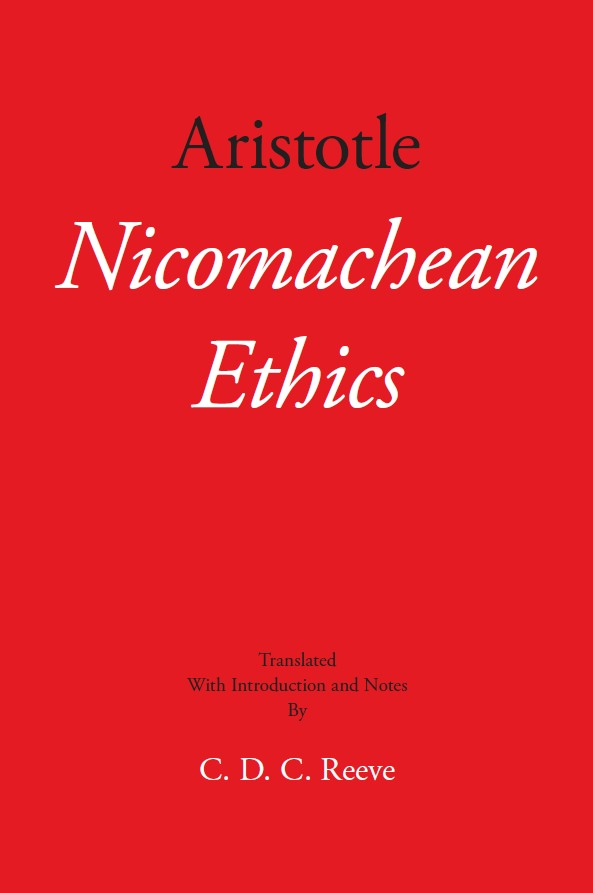
Aristotle
Nicomachean Ethics
Aristotle
Nicomachean Ethics
Translated
With Introduction and Notes
By
C. D. C. Reeve
Hackett Publishing Company, Inc.
Indianapolis/Cambridge
Copyright 2014 by Hackett Publishing Company, Inc.
All rights reserved
Printed in the United States of America
17 16 15 14 1 2 3 4 5 6 7
For further information, please address
Hackett Publishing Company, Inc.
P.O. Box 44937
Indianapolis, Indiana 46244-0937
www.hackettpublishing.com
Composition by Aptara, Inc.
Library of Congress Cataloging-in-Publication Data
Aristotle.
[Nicomachean ethics. English]
Nicomachean ethics / Aristotle; translated with introduction and notes by
C.D.C. Reeve.
pages cm
Includes bibliographical references and index.
ISBN 978-1-62466-117-4 (pbk.)ISBN 978-1-62466-118-1 (cloth)
1. Ethics. I. Reeve, C. D. C., 1948 translator. II. Title.
B430.A5R438 2014
171.3dc23
2013037301
ePub ISBN: 978-1-62466-166-2
C.D.C. Reeve and Patrick Lee Miller, eds., Introductory Readings in Ancient Greek and Roman Philosophy. General Introduction by Lloyd P. Gerson.
Aristotle, Nicomachean Ethics, second edition. Translated, with Introduction, by Terence Irwin.
Aristotle, Selections. Translated by Terence Irwin and Gail Fine.
Aristotle, Politics. Translated, with Introduction, by C.D.C. Reeve.
For
Ela
&
Pavlos

Contents
______________________________________
Readers of the Nicomachean Ethics in translation find themselves in territory whose apparent familiarity is often deceptive and inimical to proper understanding: politik isnt quite politics, epist
isnt quite politics, epist m
m isnt quite science, praxis isnt quite action, the
isnt quite science, praxis isnt quite action, the ria isnt quite theory, eudaimonia isnt quite happiness, ergon isnt quite function, aret
ria isnt quite theory, eudaimonia isnt quite happiness, ergon isnt quite function, aret isnt quite virtue. Even what the Ethics is about isnt quite ethics. A worthwhile translation must try to compensate for this deceptive familiarity without producing too much potentially alienating distance and strangeness in its place.
isnt quite virtue. Even what the Ethics is about isnt quite ethics. A worthwhile translation must try to compensate for this deceptive familiarity without producing too much potentially alienating distance and strangeness in its place.
Accuracy and consistency in translation is essential to achieving this goal, obviously, but so too are extensive annotation and commentary. Much of this, however, can consist, as it does here, of texts selected from other works of Aristotle. While traveling through the region of the Aristotelian world the Ethics describes, the reader can thus travel through other regions of it, thereby acquiring an ever widening and deepening grasp of the whole picturesomething that is crucial, in my view, to understanding any part of it adequately or, perhaps, at all.
To make the journey a convenient one, footnotes and glossary entries are replaced by sequentially numbered endnotes, so that the information most needed at each juncture is available in a single place. The non-sequential reader interested in a particular passage will find in the detailed Index a guide to places where focused discussion of a term or notion occurs. In the case of key terms, indeed, these passages are quoted so that the entry becomes a sort of glossary by Aristotle himself. The Introduction describes the book that lies ahead, explaining what it is about, what it is trying to do, what sort of evidence is relevant to its evaluation, and what sort of person has access to such evidence. It isnt a comprehensive discussion of all the important topics the Ethics contains, nor an attempt to situate Aristotles thought in the history of ethical thought more generally. Many books are readily available that attempt these tasks, including some by me. Nor is it, I should add, an expression of scholarly consensus on the topics it does discussinsofar as such a thing existsbut rather my own particular take on them.
Some readers will, I have assumed, be new to the Ethics, without much background in ancient Greek philosophy, so I have tried to keep their needs in mind. I have also had in mind, though, the needs of more advanced students, who require an English version that is sufficiently reliable and informed for their purposes.
I have benefited from the work of previous translators, including David Ross, H. Rackham, Martin Ostwald, Terence Irwin, Roger Crisp, and Christopher Rowe. The commentaries by J. A. Stewart in English and by R. A. Gauthier and J. Y. Jolif in French, as well as the notes in John Burnets edition, were an invaluable resource, as was, in the case of Books IIIV, the edition of C. C. W. Taylor; in the case of Book VI, that of L. H. G. Greenwood; and in the case of Books VIIIIX, that of Michael Pakaluk. The collection of essays on Book VII edited by Carlos Natali was also of great assistance. Information on these and other relevant works can be found in Further Reading.
Having often served as reader of other peoples translations, I can attest to the hard work it involves when done carefully. I am especially indebted, therefore, to Pavlos Kontos, who has read every line of this translation at least twice and often many more times, suggesting improvements and correcting errors. I am lucky to have had the benefit of his deep knowledge of Greek and of his devotion to a text we both love. I am even luckier that in the process of working together we have become close friends. I include him in the dedication, in inadequate recognition of what his aid and friendship, always unstintingly given, have meant to this book and to me.
Equal devotion to Greek philosophical texts, albeit of a different sort, has been demonstrated by Jay Hullett and Deborah Wilkes and their colleagues at Hackett Publishing Company, who have been my publishers, supporters, and friends for over twenty-five years.
While I was at work on the Ethics I had the good fortune to teach joint seminars on it with Mariska Leunissen and Michael Ferejohn and to profit from discussions with them and with some of the students, auditors, and visiting speakers involvedincluding John Cooper, Pierre Destre, Daniel Devereux, Gary Gala, Devin Henry, Richard Kraut, Daniel Moseley, Christiana Olfert, and Katja Vogt. Pierre, in particular, sent me many helpful comments on small points and large (that incontinence is missing from the translation is due to him) as subsequently on Book I did Mariska and James Lesher. I am grateful to Alex Rosenberg, chair of the Philosophy Department of Duke University, for providing funds for one of the seminars and to Marc Lange, chair of the Philosophy Department of the University of North Carolina at Chapel Hill, for matching those funds, for the grant of a semesters research leave, and for many other kindnesses.
I renew my thanks to KE , the first fraternity in the United States to endow a professorial chair, and to the University of North Carolina for awarding it to me. The generous research funds, among other things, that the endowment makes available each year have allowed me to travel to conferences and to acquire books, computers, and other research materials and assistance, without which my work would have been much more difficult.
All these debts are dwarfed, however, by the debt I owe to Aristotle himself and to his teacher Plato. I have spent much of the past forty years in the company of these great philosophers and in thinking along with them have participated to some extent in the life theyquite reasonably in my experiencethought happiest.
Font size:
Interval:
Bookmark:
Similar books «Nicomachean Ethics»
Look at similar books to Nicomachean Ethics. We have selected literature similar in name and meaning in the hope of providing readers with more options to find new, interesting, not yet read works.
Discussion, reviews of the book Nicomachean Ethics and just readers' own opinions. Leave your comments, write what you think about the work, its meaning or the main characters. Specify what exactly you liked and what you didn't like, and why you think so.

